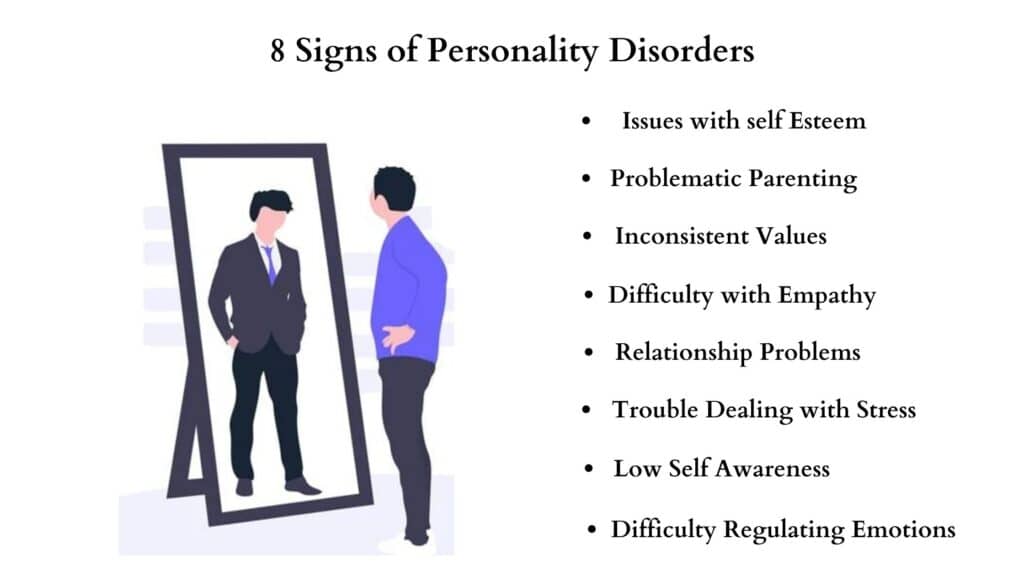There are several types of personality disorders. Some, such as paranoid personality disorder and obsessive-compulsive disorder, are familiar to many, but these are not the only diagnoses treated in a mental health treatment program. Whether well-known or otherwise, millions of Americans of all ages live with personality disorder symptoms that may make accomplishing day-to-day tasks challenging.
Feeling trapped by rigid thought patterns and behavior?
What is a Personality Disorder?
Personality disorders are described as a category of mental health conditions characterized by unhealthy feelings and behaviors. Because there are several types of personality disorders, symptoms present differently from person to person and depending on their diagnosis. People with a personality disorder often exhibit rigid or inflexible behavior and thought patterns. It is not uncommon for someone with a personality disorder to struggle significantly with relationships. They will often have difficulties forging new relationships and maintaining existing ones.
Day-to-day stressors are also challenging to manage in ways that others, such as employers, family, or friends, find acceptable because the individual with the personality disorder finds their actions okay or “normal,” whereas others see them as socially unacceptable. This often leads to a common symptom of personality disorders called blame-shifting.
The person with the personality disorder may blame their social and personal challenges on others rather than consider they could be linked to a deeper problem. Blame-shifting behavior frequently causes significant problems in academic, personal, or employment environments. Without help and treatment, someone who struggles with a personality disorder will find they struggle with social and personal relationships.

Causes and Symptoms
The root causes of personality disorders remain largely unknown. Despite ongoing and extensive research, these mental health challenges remain some of the least understood or recognized mental health disorders. Current studies suggest several factors, including genetics, substance use disorders, and trauma history, may contribute to personality disorder development. To date, there is minimal evidence to suggest personality disorders are present at birth; however, certain genetic factors may contribute to an elevated risk for their development as one gets older.
Causes of Personality Disorders
1. Genetics: Some personality disorders, like obsessive-compulsive personality disorder, may have genetic roots. Scientists have identified specific genetic anomalies linked to traits such as aggression and anxiety, which are associated with these disorders.
2.Verbal Abuse: Childhood experiences of verbal abuse have been associated with higher risks of developing personality disorders such as borderline, narcissistic, obsessive-compulsive, or paranoid types in adulthood.
3.Cultural Factors: Cultural influences also play a role in the prevalence of personality disorders across different regions. For instance, there are notable variations in the rates of specific personality disorders between countries like Taiwan, China, and Japan, suggesting cultural factors may influence their development.
4. Brain Changes: Studies indicate that individuals with certain personality disorders exhibit distinct brain differences. For instance, research on paranoid personality disorder highlights altered amygdala function, a brain region crucial for processing fear stimuli. Similarly, findings on schizotypal personality disorder reveal structural changes in the frontal lobe.
5. Childhood Trauma: There is evidence linking childhood traumas, including abuse, to the development of personality disorders. For example, individuals with borderline personality disorder often report high rates of childhood sexual trauma, which can affect their ability to form healthy relationships later in life.
Symptoms of Personality Disorders
While symptoms vary across the 10 different types of personality disorders, common features include:
– Identity Issues: Individuals with personality disorders often struggle with a stable sense of self, leading to fluctuating self-esteem and self-image based on circumstances or relationships.
– Relationship Challenges: Forming and maintaining stable relationships can be difficult due to problematic beliefs and behaviors. This may manifest as lack of empathy, emotional detachment, or excessive neediness for attention.
What are the Different Types of Personality Disorders?
When you seek help for a mental health concern, the first step in treatment is generally an assessment. Members of your treatment team will ask questions about your symptoms to learn more about your specific needs. The DSM-5 or Diagnostic and Statistical Manual of Mental Disorders provides specific diagnostic criteria for mental health providers to reference when assessing the severity of mental health or substance use disorders. In the DSM, personality disorders are separated into three clusters. Some people may experience symptoms from one cluster, whereas others may have symptoms from two or all three.
Cluster A Personality Disorders
Cluster A personality disorders are characterized by odd, eccentric, or peculiar behavior. There are three main types within this cluster: paranoid personality disorder, schizoid personality disorder, and schizotypal personality disorder.
1. Paranoid Personality Disorder
Individuals with PPD exhibit a pervasive distrust and suspicion of others, often interpreting benign actions as malevolent. They are hypervigilant, constantly on guard for any signs of betrayal or harm. This disorder can severely impact relationships and lead to social isolation.
2. Schizoid Personality Disorder
Schizoid personality disorder is characterized by a lack of interest in social relationships, often preferring solitude and introspection. Individuals with this disorder may appear emotionally detached and have limited emotional expression. They tend to focus on solitary activities and may struggle with forming close relationships.
3. Schizotypal Personality Disorder
Peculiar behavior, unusual beliefs, and difficulties with social interactions mark schizotypal personality disorder. Individuals with this disorder may have eccentric thinking patterns, display odd speech, and experience perceptual distortions. They often struggle with forming and maintaining close relationships due to their social anxiety and mistrust.
Cluster B Personality Disorders
Cluster B personality disorders are characterized by dramatic, emotional, or erratic behavior. The three main types within this cluster are borderline personality disorder, narcissistic personality disorder, and antisocial personality disorder.
1. Borderline Personality Disorder
A BPD is characterized by intense and unstable emotions, turbulent relationships, and impulsive behavior. Individuals with this disorder often struggle with a strong fear of abandonment and have difficulty regulating their emotions. They may engage in self-destructive behaviors and have a distorted sense of self.
2. Narcissistic Personality Disorder
Narcissistic personality disorder is characterized by an inflated sense of self-importance, a constant need for admiration, and a lack of empathy for others. Individuals with this disorder may have a grandiose sense of self and believe they are entitled to special treatment. They often have fragile self-esteem and may react negatively to criticism or perceived slights.
3. Antisocial Personality Disorder
Antisocial personality disorder is characterized by a disregard for the rights of others and a lack of empathy or remorse. Individuals with this disorder may engage in impulsive and irresponsible behavior, often disregarding societal norms and rules. They may have a history of legal problems and a pattern of manipulative and deceitful behavior.
Cluster C Personality Disorders
Cluster C personality disorders are characterized by anxious, fearful, or avoidant behavior. The three main types within this cluster are avoidant personality disorder, dependent personality disorder, and obsessive-compulsive personality disorder.
Avoidant Personality Disorder
Avoidant personality disorder is characterized by feelings of inadequacy, extreme sensitivity to rejection, and a fear of social interactions. Individuals with this disorder may avoid social situations due to a fear of embarrassment or criticism. They often have low self-esteem and may struggle with forming close relationships.
Dependent Personality Disorder
Dependent personality disorder is characterized by an excessive need to be taken care of and a fear of being alone. Individuals with this disorder may have difficulty making decisions without reassurance from others and may go to great lengths to obtain support and approval. They often have difficulty asserting themselves and may tolerate mistreatment or abuse.
Obsessive-Compulsive Personality Disorder
Obsessive-compulsive personality disorder is characterized by a preoccupation with orderliness, perfectionism, and control. Individuals with this disorder may have rigid thinking patterns and a strong need for control over their environment. They may struggle with flexibility and may prioritize work or productivity over personal relationships.
Borderline Personality Disorder

Borderline Personality Disorder (BPD) is a complex mental health condition characterized by unstable moods, self-image, and relationships. Individuals with BPD often struggle with intense emotions, fear of abandonment, and difficulties in regulating their emotions. This disorder affects approximately 1.6% of the adult population, with a higher prevalence among women.
The distinct characteristics of BPD include unstable relationships, impulsive behavior, self-harm tendencies, and a chronic feeling of emptiness. People with BPD often experience intense mood swings, oscillating between extreme highs and lows. These emotional fluctuations can significantly impact their relationships and overall well-being.
While the exact causes of BPD are unknown, research suggests a combination of genetic, environmental, and neurobiological factors. Traumatic experiences, such as childhood abuse or neglect, can also contribute to the development of BPD.
Treatment for BPD typically involves a combination of psychotherapy, medication, and support groups. Dialectical Behavior Therapy (DBT), a type of cognitive-behavioral therapy, has shown promising results in helping individuals manage their emotions and improve their quality of life. With the right support and treatment, individuals with BPD can lead fulfilling and meaningful lives.
Narcissistic personality disorder

Narcissistic Personality Disorder (NPD) is characterized by an exaggerated sense of self-importance, a constant need for admiration, and a lack of empathy towards others. Individuals with NPD often have a grandiose sense of self and believe they are unique and superior to others. This disorder affects approximately 1% of the general population, with a higher prevalence among men.
People with NPD may exhibit a range of behaviors, including a strong sense of entitlement, a tendency to exploit others for personal gain, and a lack of empathy toward the feelings and needs of others. They often have a fragile self-esteem that is dependent on external validation and may react aggressively when their superiority is questioned or criticized.
The causes of NPD are not fully understood, but research suggests a combination of genetic, environmental, and psychological factors. Childhood experiences, such as excessive praise or criticism, can contribute to the development of NPD.
Treatment for NPD can be challenging, as individuals with this disorder often struggle to acknowledge their own shortcomings. However, psychotherapy, such as cognitive-behavioral therapy, can help individuals with NPD develop healthier coping mechanisms and improve their interpersonal relationships. It is important to approach individuals with NPD with empathy and understanding, as their behaviors often stem from deep-seated insecurities and vulnerabilities.
Antisocial Personality Disorder

Antisocial Personality Disorder (ASPD) is a mental health condition characterized by a disregard for the rights and feelings of others. Individuals with ASPD often engage in impulsive and irresponsible behavior, disregard societal norms, and lack remorse for their actions. This disorder affects approximately 3% of the general population, with a higher prevalence among men.
The distinct characteristics of ASPD include a history of conduct disorder during childhood, a tendency to engage in criminal behavior, a lack of empathy or remorse, and a manipulative and deceitful nature. People with ASPD may exhibit a pattern of lying, manipulation, and disregard for the safety and well-being of others.
The exact causes of ASPD are not well understood, but research suggests a combination of genetic, environmental, and neurobiological factors. Childhood experiences, such as a history of abuse or neglect, can also contribute to the development of ASPD.
Treatment for ASPD can be challenging, as individuals with this disorder often resist therapy and have difficulty forming trusting relationships. However, approaches such as cognitive-behavioral therapy and group therapy can help individuals with ASPD develop empathy, impulse control, and responsible decision-making. It is crucial to prioritize the safety of oneself and others when dealing with individuals with ASPD.
Avoidant Personality Disorder

Avoidant Personality Disorder (AVPD) is characterized by social inhibition, feelings of inadequacy, and extreme sensitivity to negative evaluation. Individuals with AVPD often avoid social interactions and fear rejection or criticism. This disorder affects approximately 2.4% of the general population, with similar prevalence among men and women.
The distinct characteristics of AVPD include a pervasive pattern of social discomfort, low self-esteem, a fear of being embarrassed or humiliated, and a tendency to avoid situations that involve interpersonal contact. People with AVPD may struggle with making friends, forming romantic relationships, and expressing themselves in social settings.
The exact causes of AVPD are not well understood, but research suggests a combination of genetic, environmental, and neurobiological factors. Childhood experiences, such as excessive criticism or rejection, can contribute to the development of AVPD.
Treatment for AVPD typically involves psychotherapy, particularly cognitive-behavioral therapy, which can help individuals challenge and modify their negative beliefs about themselves and others. Group therapy can also be beneficial, as it provides a safe and supportive environment for individuals with AVPD to practice social skills and build self-confidence.
Obsessive-compulsive Personality Disorder

Obsessive-Compulsive Personality Disorder (OCPD) is characterized by a preoccupation with orderliness, perfectionism, and control. Individuals with OCPD often have rigid and inflexible thinking patterns and tend to prioritize work and productivity over interpersonal relationships. This disorder affects approximately 2.1% of the general population, with a higher prevalence among men.
The distinct characteristics of OCPD include a perfectionistic approach to tasks, a need for control, a preoccupation with details, and a reluctance to delegate tasks to others. People with OCPD may struggle with flexibility, have difficulty adapting to change, and may be overly critical of themselves and others.
The causes of OCPD are not well understood, but research suggests a combination of genetic, environmental, and neurobiological factors. Childhood experiences, such as excessive parental demands for perfection, can contribute to the development of OCPD.
Treatment for OCPD typically involves psychotherapy, particularly cognitive-behavioral therapy, to help individuals challenge their rigid thinking patterns and develop healthier coping mechanisms. It is important to approach individuals with OCPD with empathy and understanding, as their behaviors often stem from a deep-seated need for control and order.
Your Path to Recovery Begins Here
How to Find Treatment for Personality Disorders
People with personality disorders do not often choose to seek help at a treatment center like Relevance Recovery. For this reason, many who struggle with symptoms will avoid seeking help to understand their emotions and how to take the first steps towards wellness. The unwillingness to acknowledge symptoms or seek help often holds true until their symptoms begin to interfere with their day-to-day lives. It is not uncommon for someone with a personality disorder, regardless of which type, to feel threatened by others, so voluntarily seeking out help feels counterintuitive and challenging what they think is “normal.”If you or a loved one struggles with a personality disorder, it is vital to seek treatment to manage your symptoms. The very nature of personality disorders makes acknowledging the need for help challenging. However, without the support and guidance provided at Relevance Recovery, symptoms will only worsen with time, making a recovery more complex and challenging. As part of treatment, you will also learn how to cope with triggering events or situations to manage emotions and challenges in the future better. Let our experienced and supportive staff help you take the first steps on your recovery journey. Reach out to our admissions team today for more information about our treatment programs in Freehold, NJ.









